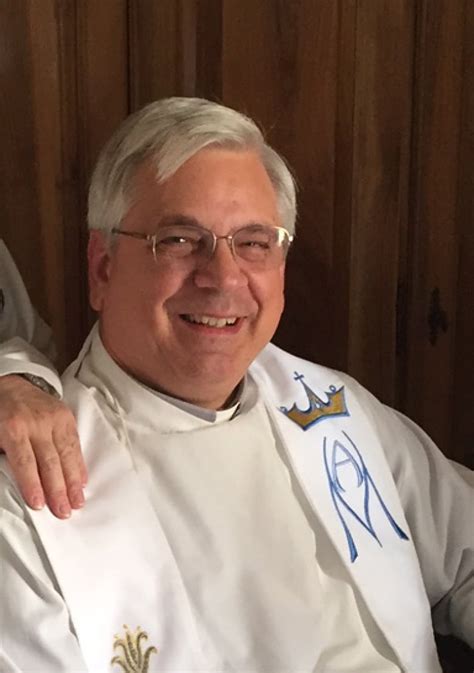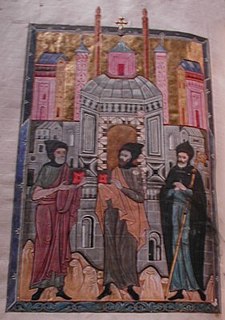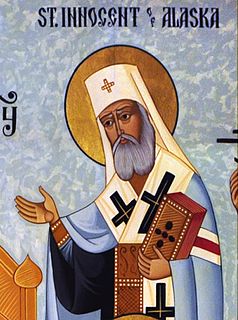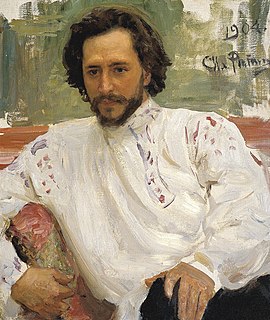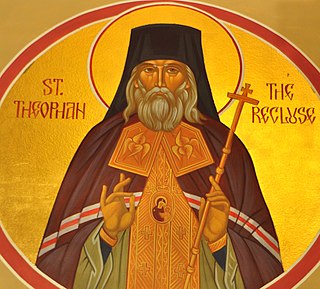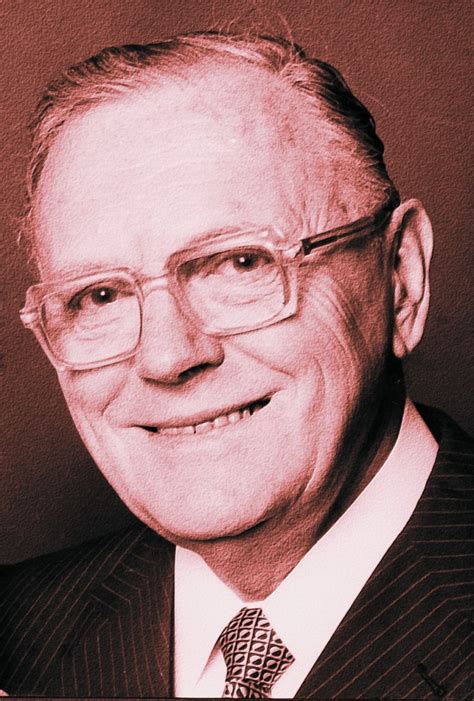Top 159 Apostle Quotes & Sayings - Page 3
Explore popular Apostle quotes.
Last updated on April 20, 2025.
Whosoever you are who introduce new doctrines, I beseech you to spare the ears of Romans! Spare that faith which was commended by the voice of an Apostle. Why should you attempt to teach us, at the end of hundreds of years, that which we never heard before? Why bring forward what Peter and Paul did not will to make known? Until this day, the world was Christian without your doctrine. Thus, I hold as an old man onto that faith wherein I was regenerated as a boy.
To expect people to be good, to be just, to be temperate, etc., without showing them how they should become so, seems like the ineffectual charity mentioned by the apostle, which consisted in saying to the hungry, the cold and the naked, be ye fed, be ye warmed, be ye clothed, without showing them how they should get food, fire or clothing.
I am in Birmingham because injustice is here. Just as the eighth century prophets left their little villages and carried their "thus saith the Lord" far beyond the boundaries of their home towns; and just as the Apostle Paul left his little village of Tarsus and carried the gospel of Jesus Christ to practically every hamlet and city of the Graeco-Roman world, I too am compelled to carry the gospel of freedom beyond my particular home town. Like Paul, I must constantly respond to the Macedonian call for aid.
To commit herself to becoming "an apostle of Joy" when humanly speaking she might have felt at the brink of despair, was heroic indeed. She could do so because her joy was rooted in the certitude of the ultimate goodness of God's loving plan for her. And though her faith in this truth did not touch her soul with consolation, she ventured to meet the challenges of life with a smile. Her one lever was her blind trust in God.
Provide yourself with such work for your hands as can be done, if possible, both during the day and at night, so that you are not a burden to anyone, and indeed can give to others, as St. Paul the Apostle advises (cf. I Thess. 2:9; Eph. 4:28). In this manner you will overcome the demon of listlessness and drive away all the desires suggested by the enemy; for the demon of listlessness takes advantage of idleness. 'Every idle man is full of desires' (Prov. 13:4 LXX).
The Church was resolved to have a New Testament, and as, after the lapse of more than three hundred years, no handwriting could be proved or disproved, the Church, which like former impostors had then gotten possession of the State, had everything its own way. It invented creeds, such as that called the Apostle's Creed, the Nicean Creed, the Athanasian Creed, and out of the loads of rubbish that were presented it voted four to be Gospels, and others to be Epistles, as we now find them arranged.
The members of the department became like the Athenians who, according to the Apostle Paul, "spent their time in nothing else, but either to tell or to hear some new thing." Anyone who thought he had a bright idea rushed out to try it out on a colleague. Groups of two or more could be seen every day in offices, before blackboards or even in corridors, arguing vehemently about these 'brain storms.' It is doubtful whether any paper ever emerged for publication that had not run the gauntlet of such criticism. The whole department thus became far greater than the sum of its individual members.
Just as in a physical body the operation of one member contributes to the good of the whole body, so it is in a spiritual body such as the Church. And since all the faithful are one body, the good of one member is communicated to another; everyone members, as the Apostle says, of one another [Eph 4:25]. For that reason, among the points of faith handed down by the Apostles, is that there is a community of goods in the Church, and this is expressed in the words Communion of Saints.
Why pray? Evidently, God likes to be asked. God certainly does not need our wisdom or our knowledge, nor even the information contained in our prayers ("your Father knows what you need before you ask him"). But by inviting us into the partnership of creation, God also invites us into relationship. God is love, said the apostle John. God does not merely have love or feel love. God is love and cannot not love. As such, God yearns for relationship with the creatures made in his image.
The first duty of a Christian, of a disciple and follower of Jesus Christ, is to deny himself. To deny oneself means to give up one's bad habits, to root out of the heart all that ties us to the world; not to cherish bad desires and thoughts; to quench and suppress bad thoughts; to avoid occasions of sin; not to do or desire anything from self-love but to do everything out of love for God. To deny oneself means, according to the Apostle Paul, to be dead to sin and the world, but alive to God.
...we must first scrutinize thoroughly anything appearing in our hearts or any saying suggested to us. Has it come purified from the divine and heavenly fire of the Holy Spirit? Or does it lean toward Jewish superstition? Is its surface piety something which has come down from bloated worldly philosophy? We must examine this most carefully, doing as the apostle bids us: 'Do not believe in every spirit, but make sure to find out if spirits are from God'.
The Church even now is the kingdom of Christ and the kingdom of heaven. Accordingly, even now His saints reign with Him, though otherwise than as they shall reign hereafter; and yet, though the tares grow in the Church along with the wheat, they do not reign with Him. For they reign with Him who do what the apostle says, 'If you are risen with Christ, mind the things which are above, where Christ sits at the right hand of God. Seek those things which are above, not the things which are on the earth'.
I love a statement by the apostle Paul, in the Book of Philippians in the Bible. I think the Corinthians had been writing to Paul, telling him that old men were chasing young women, nobody was tithing - and all that must have run Paul crazy. He wrote back and said, "If there be anything of good report, speak of these things." That's one of my principles.It's another discipline that I encourage myself to employ - to, as much as possible, say the courteous thing, and then be it.
Perfection... is clearly not achieved simply by being naked, by the lack of wealth or by the rejection of honors, unless there is also that love whose ingredients the apostle described (cf. I Cor. 13) and which is to be found solely in purity of heart. Not to be jealous, not to be puffed up, not to act heedlessly, not to seek what does not belong to one, not to rejoice over some injustice, not to plan evil - what is this and its like if not the continuous offering to God of the heart that is perfect and truly pure, a heart kept free of all disturbance?
Listen to these words of [apostle] Paul: "We war not against flesh and blood, but against principalities and powers, and the rulers of the darkness of this world and spiritual wickedness that's in high places." It's in "high places" that the plot against Black and Brown, and poor White is going on; it's spiritual wickedness that's way up in the ruling classes of religious people who don't want to see the little man rise. It's the principalities and the powers.
... the Apostle Peter declared that the Church was built by the Holy Spirit. For you read that he said: 'God, Who knows the hearts of men, bore witness, giving them the Holy Spirit, even as was given to us; and He made no distinction between us and them, purifying their hearts by faith' (Acts 15:8-9). In which is to be considered, that as Christ is the Cornerstone, Who joined together both peoples into one, so, too, the Holy Spirit made no distinction between the hearts of each people, but united them.
I want to be the apostle of self destruction. I want my book to affect man's reason, his emotions, his nerves, his whole animal nature. I should like my book to make people turn pale with horror as they read it, to affect them like a drug, like a terrifying dream, to drive them mad, to make them curse and hate me but still to read me.
Do this and you will be an apostle, a fulfiller of what the Lord chose you for, an accomplisher of your calling as messenger. When at first you succeed in all this, then perhaps the Lord will appoint you as a special ambassador-to save others after you have saved yourself; and to help those who are tempted, after you yourself pass through all temptations, and through all experiences in good and evil.
This is the highest honour of the Church, that, until He is united to us, the Son of God reckons himself in some measure imperfect. What consolation is it for us to learn, that, not until we are along with him, does he possess all his parts, or wish to be regarded as complete! Hence, in the First Epistle to the Corinthians, when the apostle discusses largely the metaphor of a human body, he includes under the single name of Christ the whole Church.
In the Catholic Church, there are many other things which most justly keep me in her bosom. The consent of peoples and nations keeps me in the Church; so does her authority, inaugurated by miracles, nourished by hope, enlarged by love, established by age. The succession of priests keeps me, beginning from the very seat of the Apostle Peter, to whom the Lord, after His resurrection, gave it in charge to feed His sheep (Jn 21:15-19), down to the present episcopate.
Now, I appeal to the consciences of those that persecute, torment, destroy, and kill other men upon pretence of religion, whether they do it out of friendship and kindness towards them or no? I say, if all this be done merely to make men Christians and procure their salvation, why then do they suffer whoredom, fraud, malice and such-like enormities, which (according to the Apostle) manifestly relish of heathenish corruption, to predominate so much and abound amongst their flocks and people?
The heavenly Father Whom we worship is the Father of the Truth, namely, of the only-begotten Son, and has the Spirit of Truth, the Holy Spirit, and those who worship Him in these Two do so because they believe in these Persons and act through Them. For the Apostle tells us that it is through the Spirit that we worship and pray (cf. Rom. 8:26), and God's only-begotten Son says, 'No man cometh unto the Father, but by Me' (John 14:6).
The greatest responsibility in this world that God has laid upon us is to seek after our dead. The apostle says, 'They without us cannot be made perfect'; for it is necessary that the sealing power should be in our hands to seal our children and our dead for the fulness of the dispensation of times-a dispensation to meet the promises made by Jesus Christ before the foundation of the world for the salvation of man.
Art, not less eloquently than literature, teaches her children to venerate the single eye. Remember Matsys. His representations of miser-life are breathing. A forfeited bond twinkles in the hard smile. But follow him to an altar-piece. His Apostle has caught a stray tint from his usurer. Features of exquisite beauty are seen and loved; but the old nature of avarice frets under the glow of devotion. Pathos staggers on the edge of farce.
The Christian gospel is a message of freedom through grace and we must stand fast in the liberty wherewith Christ has made us free. But what shall we do with our freedom? The Apostle Paul grieved that some of the believers of his day took advantage of their freedom and indulged the flesh in the name of Christian liberty. They threw off discipline, scorned obedience and made gods of their own bellies.
If... God highly exalted Christ because He humbled Himself, suffered dishonour, was tempted and endured a shameful cross and death for our sake, how will He save, glorify and raise us up if we neither choose humility, nor show love to our fellows, nor gain our souls by enduring temptation (cf. Lk. 21:19), nor follow the saving Guide through the 'strait gate' and along the 'narrow way' leading to eternal life (Mt. 7:14)? To this end we were called, says Peter, the chief Apostle, ' Because Christ also suffered for us, leaving us an example that we should follow His steps' (I Pet. 2:21).
In the opening chapters of the Book of Revelation the Apostle John tells us how on the Isle of Patmos he was given an awesome vision of the Lord Jesus, risen from the dead. Then John says, 'When I saw Him, I fell at His feet as dead.' He tells us not only the vision itself, but the profound effect it had on him. It utterly prostrated him before the Lord until He came and laid His right hand on him and said 'Fear not.'
When the soul is solidly rooted in... peacefulness, when it is freed of the bonds of every carnal urge, when the unshaking thrust of the heart is toward the one supreme Good, then the words of the apostle will be fulfilled. 'Pray without ceasing,' he said (I Thes. 5:17). 'In every place lift up pure hands, with no anger and no rivalry' (I Tim 2:8). Sensibility is, so to speak, absorbed by this purity. It is reshaped in the likeness of the spiritual and the angelic so that all its dealings, all its activity will be prayer, utterly pure, utterly without tarnish.
The Apostle John said, " Beloved, now we are the sons of God." He didn't say by and by we are going to become sons of God. He said we are that now, today, this moment.
" Now we are the sons of God, and it doth not yet appear what we shall be but we know that, when he shall appear, we shall be like him; for we shallsee him as he is"
O Jesus in the Blessed Sacrament, I would like to be filled with love for You; keep me closely united with You, may my heart be near to Yours. I want to be to You like the apostle John. O Mary of the Rosary, keep me recollected when I say these prayers of yours; bind me forever, with your rosary, to Jesus of the Blessed Sacrament. Blessed be Jesus, my love.
...it is proper that the duty of helping the poor and unfortunate should especially stir Catholics, since they are members of the Mystical Body of Christ. In this we have come to know the love of God, said John the Apostle, that He laid down His life for us, and we likewise ought to lay down our life for the brethren. He who has the goods of this world and sees his brother in need and closes his heart to him, how does the love of God abide in him? (1Jn 3:16 17)
... whenever Christ, the Bridegroom of pure souls, is mystically united with each soul, He gives the Father occasion to rejoice over this as at a wedding. It is Christ Himself Who says, 'Joy shall be in heaven over one sinner who repents' (Lk. 15:7). For joy, according to the Apostle, is the fruit of the Holy Spirit (Gal. 5:22), Who through conversion brings back to Christ those living in repentance, and reunites them with Him. And this joy embraces both those in heaven and godly men on earth. That is why there is joy in heaven over one repentant sinner.
I am not what I ought to be! Ah! how imperfect and deficient! - I am not what I wish to be! I 'abhor what is evil,' and I would 'cleave to what is good!' - I am not what I hope to be! Soon, soon, I shall put off mortality: and with mortality all sin and imperfection! Yet, though I am not what I ought to be, nor what I wish to be, nor what I hope to be, I can truly say, I am not what I once was - a slave to sin and Satan; and I can heartily join with the Apostle, and acknowledge; By the grace of God, I am what I am!
The fake healers make you dependent. They aggrandize their personality cult and finances. They increase their stature with titles like Doctor, Bishop, Apostle, Prophet. This increases their authority to manipulate. Watch out for those who put themselves above you. The real ones point to Christ in you. You can pray just like anyone else. The gifts of the Spirit belong to the Holy Spirit. You have this inside you by faith and can be a conduit.
In his essay 'Self-Reliance' Emerson wrote, 'Whoso would be a man must be a nonconformist.' The Apostle Paul reminds us that whoso would be a Christian must also be a a nonconformist. Any Christian who blindly accepts the opinions of the majority and in fear and timidity follows a path of expediency and social approval is a mental and spiritual slave.
Do not desert a friend in time of need, nor forsake him nor fail him, for friendship is the support of life. Let us then bear our burdens as the Apostle has taught (cf. Gal. 6:2): for he spoke to those whom the charity of the same one body had embraced together. If friends in prosperity help friends, why do they not also in times of adversity offer their support? Let us aid by giving counsel, let us offer our best endeavors, let us sympathize with them with all our heart.
What an honourable thing is it to be fishers of men! How great an honour shouldst thou esteem it, to be a catcher of souls! We are workers together with God, says the apostle. If God has ever so honoured thee, O that thou knewest it, that thou mightst bless his holy name, that ever made such a poor fool as thee to be a co-worker with him. God has owned thee to do good to those who were before caught. O my soul, bless thou the Lord. Lord, what am I, or what is my father's house, that thou hast brought me to this?
Paul was Nero's prisoner, but Nero was much more God's... But how does the great apostle spend his time in prison?... We read of no dispatches sent to court to procure his liberty; but many to the churches, to help them to stand fast in the liberty wherewith Christ had made them free... The devil had as good have let Paul alone, for he no sooner comes into prison but he falls a preaching, at which the gates of Satan's prison fly open, and poor sinners come forth.



